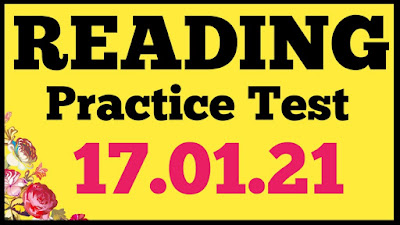IELTS READING PRACTICE TEST
IELTS READING PRACTICE TEST
Caveat scripture
Let the would-be writer beware! Anyone foolhardy enough to embark on a career as a writer – whether it be an academic treatise, a novel, or even an article – should first read this!
People think that writing as a profession is glamorous; that it is just about sitting down and churning out words on a page, or more likely these days on a computer screen. If only it were! So what exactly does writing a book entail? Being a writer is about managing a galaxy of contradictory feelings: elation, despair, hope, frustration, satisfaction, and depression – and not all separately! Of course, it also involves carrying out detailed research: first to establish whether there is a market for the planned publication, and second into the content of the book. Sometimes, however, instinct takes the place of market research and the contents are dictated not by plans and exhaustive research but by experience and knowledge.
Once the publication has been embarked upon, there is a long period of turmoil as the text takes shape. A first draft is rarely the final text of the book. Nearly all books are the result of countless hours of altering and reordering chunks of text and deleting the embarrassing bits. While some people might think that with new technology the checking and editing process is speeded up, the experienced writer would hardly agree. Unfortunately, advanced technology now allows the writer the luxury of countless editings; a temptation many of us find hard to resist. So a passage, endlessly reworked may end up nothing remotely like the original, and completely out of place when compared with the rest of the text.
After the trauma of self-editing and looking for howlers, it is time to show the text to other people, friends perhaps, for appraisal. At this stage, it is not wise to send it off to a literary agent or direct to publishers, as it may need further fine-tuning of which the author is unaware. Once an agent has been approached and has rejected a draft publication, it is difficult to go and ask for the revamped text to be considered again. It also helps, at this stage, to offer a synopsis of the book, if it is a novel, or an outline if it is a textbook. This acts as a guide for the author, and a general reference for friends and later for agents.
Although it is tempting to send the draft to every possible agent at one time, it is probably unwise. Some agents may reject the publication out of hand, but others may proffer some invaluable advice, for example about the content or the direction to be taken. Hints like this may be of use in finally being given a contract by an agent or publisher.
The lucky few taken on by publishers or agents, then have their books subjected to a number of readers, whose job it is to vet a book: deciding .......
All the paragraphs can be repeated in upcoming exams do it and please leave a comment!!!!!



Comments
Post a Comment